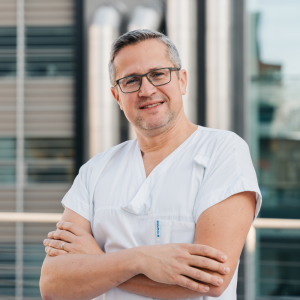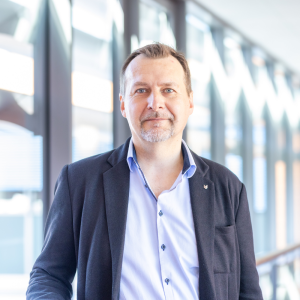NICR is not only about research results and publications. According to your colleagues who participate in it, it also forms an important platform for interdisciplinary cooperation, support of young talents, the growth of a new generation of scientists, and for the development of modern infrastructure. They all agree: a continued support of NICR is essential for maintaining the dynamic energy and international competitiveness of Czech cancer research.
-
What do you see as your most important contribution to NICR?
-
Have you ever thought about the commitments of NICR as a whole?
-
Would you like to participate in the continuation of NICR?
 Karolina Škvárová Kramarzová
Karolina Škvárová Kramarzová
Prague node, Second Faculty of Medicine of the Charles University
Focused on gene-editing applications for rare disease modeling and therapy
- My group has been intensively involved in NICR research activities from the very beginning of the consortium. Since then, we have significantly expanded our methodological expertise, particularly in gene-editing technologies. We established a comprehensive genome-wide CRISPR/Cas9 screening platform. Our pilot project, conducted in collaboration with other NICR groups, identified genes and cellular pathways involved in developing resistance to anticancer therapy for testicular tumors and neuroblastoma. This technology is broadly applicable for follow-up projects by both our group and collaborating institutions. We have also advanced our expertise in prime editing, a unique gene-editing method with substantial clinical potential. We are currently finalizing a study demonstrating correction of causal mutations in cells derived from Fanconi anemia patients, with the goal of developing efficient therapies to substantially decrease the cancer risk associated with this disorder. Such advances would not have been possible without NUVR’s financial support.
- Yes, I have. NICR represents a transformative initiative for Czech science. The consortium’s mission to improve coordination and strategic planning in oncology research, and to develop modern infrastructure, will benefit Czech cancer research for years to come, well beyond this project’s timeline.
- Absolutely, yes. NICR has enabled us to ‘think big’ through its scale and relative scientific freedom, an approach that has proven highly beneficial when directed toward excellent research groups. To conduct cutting-edge science in the Czech Republic, we must pursue high-risk, high-gain projects. However, such transformative science projects require extended timeframes to complete, and their continuous support is essential. The planned termination of NICR funding represents a dramatic disruption to the financing of such projects and significantly impacts the international competitiveness of Czech science. In our particular case, continuation of the NICR consortium financing period would enable us to address the therapy resistance in cancer much more comprehensively. Altogether, I strongly believe that continuation of the NICR consortium is essential to fulfill the potential of this unique program, which has no equivalent in the Czech scientific landscape.
 Nadia Alaei
Nadia Alaei
Prague node, Second Faculty of Medicine of the Charles University
Postdoc focused on explore the spatial relationships between leukemic cells and their surrounding niche components
- My main contribution is through my research on leukemic bone marrow 3D architecture, where I focused on the impact of distinct metabolic profiles on bone marrow structure and cellular interactions in a PDX model of ALL. This work, which I hope can improve patient diagnostics or therapeutic approaches, aligns with NICR’s scientific and clinical goals. Importantly, this research would not have been possible without the support, resources, and collaborative environment provided by NICR, which enabled interdisciplinary work and valuable connections that significantly advanced the project.
- Yes, I’m aware that NICR is dedicated to advancing impactful cancer research, supporting early-career scientists, and fostering meaningful collaboration. I strive to align my work with these core values and contribute to our shared scientific mission. I view my role as part of a broader effort to drive progress in both science and society.
- Absolutely, I would be very grateful to continue being part of NICR. I’m currently in the middle of an important stage of my project, and continued support right now is crucial, not just to finish the research successfully, but also for my growth as a researcher. This grant has been a key part of my development, giving me the chance to work on meaningful cancer research and build important skills. Being part of this active and supportive network has been both encouraging and motivating. Continued support is not only important for my own growth, but also essential to the progress of the project and my ability to make meaningful, lasting contributions to NICR’s goals. I’m deeply committed to building on this work and actively supporting NICR’s mission.
Josef Srovnal
Olomouc node, Institute of Molecular and Translational Medicine of the Faculty of Medicine of Palacký University and University Hospital Olomouc
Focus on genomics and circulating biomarkers
- What I see as my greatest contribution to NICR is that we have achieved a better understanding of liquid biopsies and developed international cooperation in this area. This area had become the main research target of our research team, and our work resulted in the publication of numerous articles in prestigious high-impact journals (e.g. Stejskal et al., Molecular Cancer 2023). Another thing I see as crucial is the training of a new generation of scientists who are competent in translational medicine. In this direction, too, we achieved a significant success: two of our colleagues, Dr Řehulková and Dr Vidlařová, have in 2023 successfully defended their dissertation theses on liquid biopsies.
- Yes, I have thought about it, quite intensively. I see NICR as an organic whole whose commitment to both patients and society at large in terms of cancer research are beyond doubt. Without institutions such as NICR, the development in diagnostics and therapy of (not only) cancer would be significantly slower and more complicated.
- Yes, I would, definitely. I see a continued participation in the development and strengthening of unique collaborations such as NICR has been creating both within the Czech Republic and abroad as crucial for the future of science and research in our country.
Stjepan Uldrijan
Brno node, Faculty of Medicine of the Masaryk University
Focus on the biology of malignant melanoma
- Regarding scientific outputs, I would like to highlight our progress in the translational regulation of essential signalling pathways, which participate at various levels in controlling the growth and division of cancer cells. In this area, we have made significant discoveries that represent a crucial shift in our understanding of the biology of malignant melanoma, its growth control mechanisms, and the development of resistance to targeted therapies. A recent publication was dedicated to uncovering completely new molecular mechanisms that influence the ERK signalling pathway, with significant implications for clinical practice. A follow-up study on other essential signalling pathways is expected to be submitted before the end of the NICR project. Aside from that, I see our equally important contribution to the mission of NICR in the number of young researchers we have managed to involve in our research actively.
- Yes, and here I am following up on my previous answer. From the outset, we viewed our participation in NICR as not only an opportunity to contribute to scientific knowledge but also as a chance to present our research to the general public, attract new talents into research, and provide them with optimal support for their future development. For example, the involvement of students in research supported by NICR enables them to experience, in practice, various modern methods of biochemistry and molecular biology that they learn about in school in theory and to participate in research that could contribute to targeted therapies for specific cancers. Another, more general aspect of the project, which I often thought of as something that NICR does exceptionally well, is a consolidation of cancer research and the formation of connections between research teams. Previously, many teams with strong cooperation potential either did not communicate or were unaware of each other. NICR and the Czech Annual Cancer Research Meeting, organised by NICR, form a unique platform that facilitates meetings and leads to new cooperations.
- Most certainly. In my view, NICR has, throughout its existence, convincingly demonstrated its profoundly positive impact on cancer research in the Czech Republic. Regarding my team, I would highlight the aforementioned role of NICR as a platform for the mutual linking of teams with different expertise. Thanks to NICR, we have established several exciting collaborative projects that have the potential to yield further high-quality scientific outputs. We would greatly appreciate the opportunity to be involved in any potential continuation of NICR.



